East New Market
Notable People and Families
Manning Family
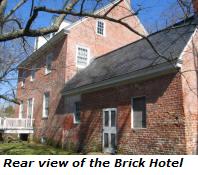 Major
Anthony Manning served as a Major during the War of 1812. In 1814 he was
appointed Captain of a Troop of Horse
for the 10th Regimental Calvary District for the militia of Maryland.
Major Manning already owned a very large estate in the south part of Dorchester
County when he bought property in East New Market in 1839. His East New
Market house was once known at the Manning House, the Brick Hotel, the
Temperance House, and the House of the Hinges. It is currently known as the
Daffin-Mitchell House.
Later in the same year Major Manning purchased the
Anderton's
Desire property in East New Market. Major Manning added to the
Daffin-Mitchell House lot in 1840 and 1842 by purchasing a small triangular
parcel at the northwest edge of the lot and buying the 3/8 acre
Waggaman parcel which was
adjoning to the
south. Major Manning married three times per the
Manning Family Bible - Elizabeth Ball Scott
1810, Harriet Willis 1828, and Ann Gootee 1841.
Major
Anthony Manning served as a Major during the War of 1812. In 1814 he was
appointed Captain of a Troop of Horse
for the 10th Regimental Calvary District for the militia of Maryland.
Major Manning already owned a very large estate in the south part of Dorchester
County when he bought property in East New Market in 1839. His East New
Market house was once known at the Manning House, the Brick Hotel, the
Temperance House, and the House of the Hinges. It is currently known as the
Daffin-Mitchell House.
Later in the same year Major Manning purchased the
Anderton's
Desire property in East New Market. Major Manning added to the
Daffin-Mitchell House lot in 1840 and 1842 by purchasing a small triangular
parcel at the northwest edge of the lot and buying the 3/8 acre
Waggaman parcel which was
adjoning to the
south. Major Manning married three times per the
Manning Family Bible - Elizabeth Ball Scott
1810, Harriet Willis 1828, and Ann Gootee 1841.
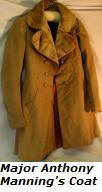 Major Anthony Manning and his third wife Ann lived
in East New Market while he owned the property as
correspondence was addressed to Major
Manning in East New Market from 1843 to 1848. Major Anthony Manning and
his wife Ann both died in 1849 and are buried at the Manning estate in
Drawbridge, Maryland. His
Last
Will and Testament was probated in 1852. He left his East New
Market property to his children, William Thomas Manning, Elizabeth Vincent (wife
of Col. John Vincent), Emily L Vincent (wife of John F. Vincent), Anthony L.
Manning, Eugenia Manning, George Washington Manning, Rosaline M. Manning, and
Anna Rebecca Manning. His son, Anthony L. Manning, was to have
"testator's brick house and lot as it is laid off in East New Market."
Major Anthony Manning and his third wife Ann lived
in East New Market while he owned the property as
correspondence was addressed to Major
Manning in East New Market from 1843 to 1848. Major Anthony Manning and
his wife Ann both died in 1849 and are buried at the Manning estate in
Drawbridge, Maryland. His
Last
Will and Testament was probated in 1852. He left his East New
Market property to his children, William Thomas Manning, Elizabeth Vincent (wife
of Col. John Vincent), Emily L Vincent (wife of John F. Vincent), Anthony L.
Manning, Eugenia Manning, George Washington Manning, Rosaline M. Manning, and
Anna Rebecca Manning. His son, Anthony L. Manning, was to have
"testator's brick house and lot as it is laid off in East New Market."
At the time of the 1850 Census, Major Anthony Manning's widow Ann, and his children George, Anna, and Rosaline lived in East New Market at the Daffin-Mitchell House. Nearby, another son, Anthony L. Manning was listed as a student living with Thomas K. Smith, merchant, and William T. Mackey (16 years old). Also nearby at the Edmondson House, his daughter Eugenia Manning (age 15) is living with William VM & Elizabeth Edmondson, their daughter Emma (age 14), Sarah Mackey (age 16), and Margaret Smith (age 10) and Lucinda Smith (age 5). Eugenia Manning would later become the wife of William VM Edmonson after his wife Elizabeth died. Anthony L. Manning would later marry Sarah Mackey.
After the passing of Major Anthony Manning, his wife and his youngest children continued to live in East New Market for a few years. Anna Manning was listed as deceased in the 1855 Tax Assessment List for East New Market. Her daughter Anna Rebecca Manning was listed guardian to George and Rosaline in the tax assessment lists from 1855 to 1859. In 1855 Eugenia Manning married William VM Edmondson. During the 1860 Census, Eugenia's half-siblings, William, George, and Rosaline were living with Eugenia and her husband. They were possibly residing in the Edmondson House, or the Daffin-Mitchell House. Next on the Census list was another daughter of Major Manning, Elizabeth Twilley (age 41) and her two children Sarah Vincent & Robert Vincent. They were possibly living in the Anderton's Desire house or the Dr. A.L. Manning house. On the 1860 Tax Assessment List, Anthony L. Manning is listed as the guardian of his half-brother George Manning and William VM Edmondson is listed as the guardian to Rosaline Manning. On the 1861 and 1862 tax assessment lists, William VM Edmondson is listed as the guardian to both George and Rosaline. By 1863-1864 Anthony L., Eugenia, George, and Rosaline were listed as on their own. By 1865 only Anthony L Manning and Eugenia Manning Edmondson remained in East New Market.
Anthony L. Manning was born in 1831. After the death of his mother, Harriet Willis Manning, his father sent him away to school at Dickinson College in Carlisle, Pennsylvania. He was attending Dickinson College during the same year (1847) that the McClintock Riots took place in Carlisle. Anthony L. Manning wrote to his father that he must not let anyone know that Professor McClintock was still teaching at the College after the riots. In 1852, Anthony L. Manning graduated from the University of Maryland Medical School in Baltimore. An 1853 letter from his sister, Eugenia, offers encouragement in increasing business at his (new) medical practice in Baltimore.

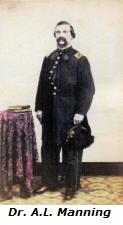 Dr.
Anthony L. Manning married Sarah E. Mackey in Baltimore in 1853. She was
the daughter of Phillip Mackey and Margaret Ann Greene.
They lived in Baltimore. In 1855, Dr. Manning hired out colored man named
Aaron as evidenced by this agreement.
Unfortunately the marriage of Dr. Anthony Manning and Sarah Mackey did not have
a happy ending as evidenced by a
poem titled "Thoust Has Been My Ruin"
written by Dr. Manning. Dr. Anthony Manning and Sarah Mackey Manning divorced in 1860.
Dr. Manning moved back to East New Market shortly thereafter as he was taxed for
personal property in East New Market in 1860. He had previously only been taxed for real
estate in East New Market prior to 1860. Since the poem is identified as
being written in East New Market, it was
likely written around 1861.
Dr.
Anthony L. Manning married Sarah E. Mackey in Baltimore in 1853. She was
the daughter of Phillip Mackey and Margaret Ann Greene.
They lived in Baltimore. In 1855, Dr. Manning hired out colored man named
Aaron as evidenced by this agreement.
Unfortunately the marriage of Dr. Anthony Manning and Sarah Mackey did not have
a happy ending as evidenced by a
poem titled "Thoust Has Been My Ruin"
written by Dr. Manning. Dr. Anthony Manning and Sarah Mackey Manning divorced in 1860.
Dr. Manning moved back to East New Market shortly thereafter as he was taxed for
personal property in East New Market in 1860. He had previously only been taxed for real
estate in East New Market prior to 1860. Since the poem is identified as
being written in East New Market, it was
likely written around 1861.
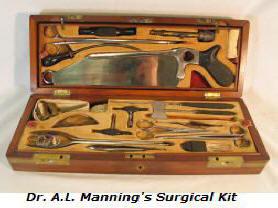 On
2 September 1862,
Governor Thomas H.
Hicks wrote a letter to Secretary of War, E.W. Stanton introducing Dr.
AL Manning as a good physician and an unflinching Union man. He stated
that Dr. Manning was desirous of being made a surgeon for the US Army.
On 1 April 1863, Dr. Manning joined the
Union Army as a Assistant Surgeon for Company S, 1st Regiment of the Eastern
Shore Infantry. Upon the invasion of Maryland and Pennsylvania by the
Confederate Army in June 1863, the 1st Eastern Shore Regiment of Infantry asked
to be sent to the Army of the Potomac at the front. With General
Lockwood's Brigade, the regiment was transported to Baltimore, and thence
marched to the battlefield of Gettysburg. They reached Gettysburg on the morning
of July 3, 1863, and immediately went into action with the 12th Army Corps on
Culp's Hill. After the battle of Gettysburg the 1st Regiment, Eastern
Shore Infantry, continued with the Army of the Potomac until the Confederate
Army was driven out of Maryland. After a brief duty on the upper Potomac,
the regiment again returned to the Eastern Shores where it continued in the
performance of special duty.
On
2 September 1862,
Governor Thomas H.
Hicks wrote a letter to Secretary of War, E.W. Stanton introducing Dr.
AL Manning as a good physician and an unflinching Union man. He stated
that Dr. Manning was desirous of being made a surgeon for the US Army.
On 1 April 1863, Dr. Manning joined the
Union Army as a Assistant Surgeon for Company S, 1st Regiment of the Eastern
Shore Infantry. Upon the invasion of Maryland and Pennsylvania by the
Confederate Army in June 1863, the 1st Eastern Shore Regiment of Infantry asked
to be sent to the Army of the Potomac at the front. With General
Lockwood's Brigade, the regiment was transported to Baltimore, and thence
marched to the battlefield of Gettysburg. They reached Gettysburg on the morning
of July 3, 1863, and immediately went into action with the 12th Army Corps on
Culp's Hill. After the battle of Gettysburg the 1st Regiment, Eastern
Shore Infantry, continued with the Army of the Potomac until the Confederate
Army was driven out of Maryland. After a brief duty on the upper Potomac,
the regiment again returned to the Eastern Shores where it continued in the
performance of special duty.
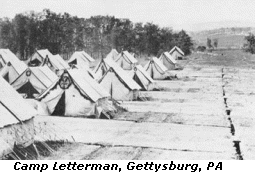 Dr.
Manning mustered out on 23 December 1864. The
Report
of Surgeon Jonathan Letterman gives details about the operation of the
medical department during the Battle of Gettysburg. The burden on Union
surgeons at Gettysburg was great. Surgeon's at Gettysburg would need to be
skilled with many medical practices, including amputation. As evidenced by
the medical instruments in Dr. Manning's two surgical kits, he likely performed
many amputations. For more information about
what surgeons encountered at Gettysburg refer to "The
Army Medical Department, Chapter 10, The Civil War in 1863,
Hammond's Last Year, pages 208-216, Care of Sick and Wounded in the East."
Dr.
Manning mustered out on 23 December 1864. The
Report
of Surgeon Jonathan Letterman gives details about the operation of the
medical department during the Battle of Gettysburg. The burden on Union
surgeons at Gettysburg was great. Surgeon's at Gettysburg would need to be
skilled with many medical practices, including amputation. As evidenced by
the medical instruments in Dr. Manning's two surgical kits, he likely performed
many amputations. For more information about
what surgeons encountered at Gettysburg refer to "The
Army Medical Department, Chapter 10, The Civil War in 1863,
Hammond's Last Year, pages 208-216, Care of Sick and Wounded in the East."
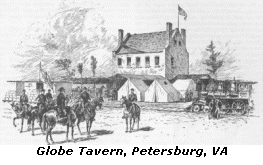 As evidenced by a
diary page written by Eugenia Manning Edmondson in 1865, their brother
George Manning fought for the Confederacy during the Civil War. George
Manning was a Sergeant for the 2nd Battalion Maryland Infantry. Around 18
August 1864, he was captured by the Union Army during the battle of
Globe Tavern just south of Petersburg,
Virginia. Confederate losses numbered 211 dead and 517 prisoners. George
Manning was captured in 1864 and sent to Point Lookout, Maryland as a prisoner.
He was there for 9 months until he was released into the custody of Anthony
Manning in May 1865.
As evidenced by a
diary page written by Eugenia Manning Edmondson in 1865, their brother
George Manning fought for the Confederacy during the Civil War. George
Manning was a Sergeant for the 2nd Battalion Maryland Infantry. Around 18
August 1864, he was captured by the Union Army during the battle of
Globe Tavern just south of Petersburg,
Virginia. Confederate losses numbered 211 dead and 517 prisoners. George
Manning was captured in 1864 and sent to Point Lookout, Maryland as a prisoner.
He was there for 9 months until he was released into the custody of Anthony
Manning in May 1865.
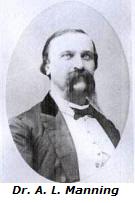 By 1867, Dr.
Manning was back in Baltimore as the Medical Board of Baltimore found him
qualified to practice medicine. During the 1870 Census, he was working as
a Physician in Baltimore and listed as a separate household in the dwelling of
restaurateur, Edward Perry and family. In 1873, as evidenced by this
letter, Dr. Manning was interested in
working as a surgeon for a European Steamer based in Philadelphia. Dr. Manning was back in East New
Market by 1876 as his nephew addressed a
letter to him there.
In 1876, he also was planning to lease his frame
dwelling in East New Market, but apparently never did. According
to the Manning Family Bible, Dr. Anthony
L. Manning, was taken suddenly ill on Friday at 10 O'clock with heart-disease-
Jan 25th 1878, & died Saturday P.M. 10 O'clock Jan 26th 1878. Dr. Manning
finalized and signed his Last Will &
Testament on the same day. The Will is one of the most interesting
and unique Wills written in Dorchester County during the 1800s. The Will
provides details for publishing of Dr. Manning's poetry book, provides
instructions for constructing his tombstone along with a long the poem to go
upon it, and provides details about the disposition of his property. Dr.
Manning probably had spent some time working on Will before he was taken
suddenly ill. On thing that was a constant in Dr. Manning's life was his
poetry. The ENM team has found 7 of his poems.
However, the elusive poetry book is yet to be
found.
By 1867, Dr.
Manning was back in Baltimore as the Medical Board of Baltimore found him
qualified to practice medicine. During the 1870 Census, he was working as
a Physician in Baltimore and listed as a separate household in the dwelling of
restaurateur, Edward Perry and family. In 1873, as evidenced by this
letter, Dr. Manning was interested in
working as a surgeon for a European Steamer based in Philadelphia. Dr. Manning was back in East New
Market by 1876 as his nephew addressed a
letter to him there.
In 1876, he also was planning to lease his frame
dwelling in East New Market, but apparently never did. According
to the Manning Family Bible, Dr. Anthony
L. Manning, was taken suddenly ill on Friday at 10 O'clock with heart-disease-
Jan 25th 1878, & died Saturday P.M. 10 O'clock Jan 26th 1878. Dr. Manning
finalized and signed his Last Will &
Testament on the same day. The Will is one of the most interesting
and unique Wills written in Dorchester County during the 1800s. The Will
provides details for publishing of Dr. Manning's poetry book, provides
instructions for constructing his tombstone along with a long the poem to go
upon it, and provides details about the disposition of his property. Dr.
Manning probably had spent some time working on Will before he was taken
suddenly ill. On thing that was a constant in Dr. Manning's life was his
poetry. The ENM team has found 7 of his poems.
However, the elusive poetry book is yet to be
found.
 Eugenia Manning Edmondson's husband Dr. William VM
Edmondson died in 1863. In 1873, she remarried to Dr. James H. Thomas.
They lived at the Anderton's Desire property. Dr. Thomas died in 1909 in
East New Market. Eugenia followed a few years later in 1916, thus bringing
an end to the Manning family's 75 years in East New Market. The following
Notice
in the Democrat & News of 16 August 1916 advertises an auction of the
Manning estate by virtue of a decree of the Circuit Court.
Eugenia Manning Edmondson's husband Dr. William VM
Edmondson died in 1863. In 1873, she remarried to Dr. James H. Thomas.
They lived at the Anderton's Desire property. Dr. Thomas died in 1909 in
East New Market. Eugenia followed a few years later in 1916, thus bringing
an end to the Manning family's 75 years in East New Market. The following
Notice
in the Democrat & News of 16 August 1916 advertises an auction of the
Manning estate by virtue of a decree of the Circuit Court.
[Special thanks for Karen Nicholson of Arlington, VA for providing a wealth of material about the Manning Family, including correspondence, poetry, and other documents.]